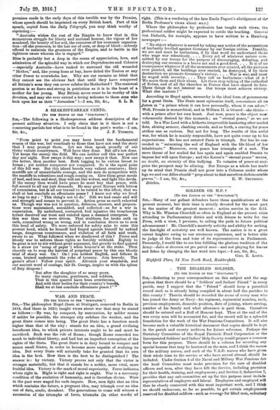WAR AND PEACE.
[To THE EDITOZ OF THE " SPECTAT011 Sue,—The philosopher Hegel (born at Stuttgart, removed to Berlin in 1818, died there in 1831) taught views about war that may be stated as follows :—By war, by conquest, by annexation, by milder means if milder be possible, the stronger city subdues the weaker, and the great State comes into being. The great State has a function much higher than that of the city : stands for an idea, a grand civilizing beneficent idea, to which private interests ought to be and must be sacrificed. Such was the rag of Rome ; though Rome conceded too much to individual liberty, and had but an imperfect conception of the rights of the State. The great State is in duty bound to conquer and annex small States, in order to become more capable of realizing its idea. But every State will naturally take for granted that its own idea is the best. How then is the best to be distinguished ? The answer, is : by victory. Victory proves not only that the victor is stronger materially, but that it stands for a nobler, more vital, more fruitful idea. Victory is the mark of moral superiority. Force indicates, where right in. Might is right and right is might. War is a necessary: condition of the evolution of humanity, and is therefore divine. Wars; in the past were waged for ends impure. Now, men fight that an idea which contains the future, a pregnant idea, may triumph over an idea out of date, senile, decadent. The generations to come will witness a succession of the triumphs of force, triumphs Cm other words) of right. (This is a rendering of the late Emile Faguet's abridgment of the Berlin Professor's views about war.)
Where the philosopher by profession has taught such views, the professional soldier might be expected to outdo the teaching. General von Disfurth, for example, appears to have written to a Hamburg newspaper :— " No object whatever is served by taking any notice of the seousations of barbarity levelled against Germany by our foreign critic*. Frankly. wo are and must be barbarians, if by that word we understand those who wage war relentlessly. . . . Every act of whatever nature com- mitted by our troops for the purpose of discouraging, defeating, and destroying our enemies is a brave act and a good deed. . . . It is of no consequence whatever if all the monuments ever created, all the pictures ever painted, all the buildings ever erected, be destroyed, if by their destruction we promote Germany's victory. . . . War is war, and must be waged with severity. . . . They call us barbarians—what of it ? We scorn them and their abuse. Let them stop talking of the cathedral of Reims, and of all the churches in France that have shared its fate. These things do not interest us. Our troops must achieve victory% What else matters ? "
According to Hegel again, monarchy is the ideal form of government for a great State. The State must epitomize itself, concentrate all its Joroes to " a prince whom it can love personally, whom it can adore." Well, Prussia is monarchical, and in William IL is blessed—she thinks— with a prince after her own heart. Just now, peace is the object most vehemently desired by this monarch ; an " eternal peace," so we are told. In a War Lord with a hitherto irrepressible hankering after mailed fiats, shining armour, clanking swords, and so forth, a craving for peace strikes one as curious. But not for long. The results of this awful war, for which he is mainly responsible, have not quite come up to his expectations. He has not entered Paris in triumph. Nor has he sus- ceeded in " saturating the soil of England with the life-blood of her inhabitants." Moreover, oven peace has triumphs of a sort. Ths mere threat of her mailed fist has again and again enabled Prussia to impose her will upon Europe ; and the Kaiser's " eternal peace " means. no doubt, an eternity of this bullying. To votaries of peace-at-any. price the prospect may be alluring. But Europe as a whole has made up its mind that Prussia shall not grow into a Colossus under whose legs we and our Allies should " peep about to find ourselves dishonourable






























 Previous page
Previous page